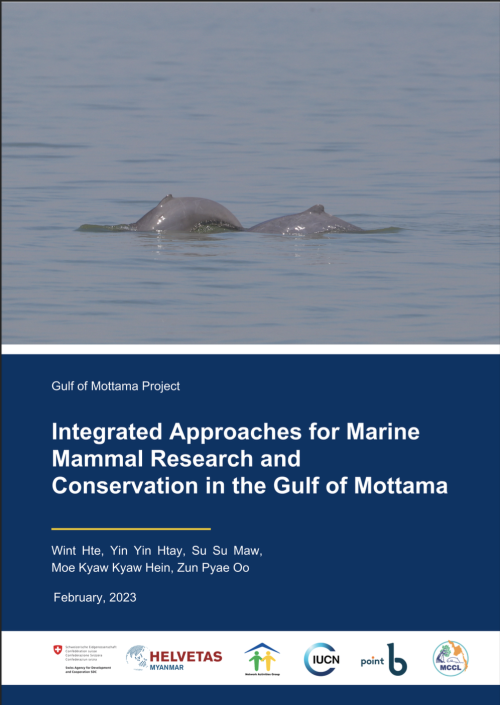In 2018, Dr. Tara Sayuri Whitty and the Myanmar Coastal Conservation Lab (MCCL) confirmed that the Gulf of Mottama (GoM) is home to threatened and endangered marine mammal species: the Irrawaddy dolphin (Orcaella brevirostris), Indo-Pacific finless porpoise (Neophocaena phocaenoides), and Indo- Pacific humpback dolphin (Sousa chinensis). The former is Endangered, and the other two species are Vulnerable (IUCN Red List). However, there is still widespread lack of data and conservation efforts on local marine mammal populations in the gulf.
The MCCL has implemented integrated approaches to conservation and research to address the data gaps and develop a sustainable model for continued research, capacity building, and community engagement in the conservation of small cetacean species in the GoM. This included estimating the population of the three cetacean species in the gulf through boat-based line transect surveys, establishing an acoustic monitoring program for N. phocaenoides, estimating bycatch rates in small-scale fisheries through Rapid Bycatch Assessments, refining our understanding of the current and past distribution of these species in the Gulf of Mottama through Local Ecological Knowledge surveys, and training community youths in research and community engagement skills. Throughout the process, communities participated in both research and conservation activities.
From 2018 to 2022, a series of marine mammal boat-based surveys were conducted, and a total of 60 sightings were recorded in opportunistic surveys and 57 sightings were recorded through systematic line transect surveys. In addition, local ecological knowledge and rapid bycatch assessment interviews were conducted in ten coastal villages of the GoM. The study recorded about 132 bycatch events in small-scale fisheries and indicated that marine mammals, including whales, were distributed up to Kyaik Hto in the gulf. The major threats of bycatch were posed by drift net, set bag net, and gill net, depending on the location in the area. The bycaught dolphins and porpoises are in high demand as consumables, particularly in Paung Township, and this demand may pose additional conservation threats to the local population of marine mammals if it increases. Regardless of the threats, the study with local communities suggested that the majority of the sample respondents preferred dolphins and porpoises and recognize the need for their conservation.
Furthermore, MCCL engaged with communities by collaborating in research activities and other awareness activities such as awareness campaigns, marine mammal stranding response training and develop educational materials to motivate the communities for participating in conservation activities. The whole process was conducted by youths in MCCL, and they were also trained in research skills and knowledge in conservation as well as provided opportunities to participate in hands-on activities through MCCL internship program and career advancement program.
This integrated approach allowed to collect fundamentally important data on the three cetacean species and implement key steps toward a regular and participatory monitoring program, while also building research skills among youths, and establishing community-based conservation programs in collaboration with local fishing communities for continued conservation efforts into the future.
Published By:
Published Date:
